Abstract
This research proposal entails an analysis of the contribution of corporate social responsibility in enhancing an organisation’s corporate image. The proposal evaluates how CSR has contributed to the improvement of the Emirates National Oil Company’s public image and reputation. A brief introduction outlining the purpose of the study, the research objectives, research questions, and the significance of the study to the target stakeholders is illustrated. The literature review evaluates the application of stakeholders, engagement, and sustainable development theories in organisations’ CSR strategies. Additionally, a brief analysis on the prevailing gap regarding CSR in the oil and gas industry is illustrated. The final section in the literature review section is a brief profile of ENOC and its commitment to CSR.
The methodology section outlines the research designs that the researcher will take into account in conducting the study. The study will entail a case study analysis, which will aid in determining the extent to which CSR has contributed to ENOC’s corporate image and reputation. A survey on 100 respondents will be conducted using questionnaires that will be distributed to the selected respondents. Additionally, the study outlines the sampling techniques and ethical considerations that will be taken into account. The resources that will be consumed in conducting the study are also outlined in the research budget and timescale.
Introduction
The purpose of this research is to investigate the role of corporate social responsibility (CSR) in enhancing the image of Emirates National Oil Company amongst its stakeholders. Furthermore, the study explores the role of CSR in promoting ENOC’s corporate image in the global business environment. The study assesses the various options that ENOC can incorporate in its quest to ensure that its CSR aligns with the American and European best practices.
The study critically analyses available literature and empirical studies by taking into account the relevant theories and models with reference to CSR. Previous studies show that discussions on achieving economic, social, and environmental sustainability have gained remarkable significance in the corporate world in the contemporary world (Ebner 2006). CSR is an important component in businesses’ efforts to achieve sustainable development through social sustainability (Rosman, Saihani & Yusof 2013). Patil (2014, p.1) defines CSR as ‘a concept whereby companies voluntarily integrate social and environmental concerns into their business operations and in their interactions with other stakeholders’.
Problem statement
The recent past has been characterised by increased attention on environmental and social issues. Subsequently, different stakeholders are pushing for a high level of corporate accountability towards all the organisational stakeholders. The expansion of CSR as a tool for brand enhancement and reputational management has been of considerable academic support and it can be broken by the stakeholder theory and the sustainable development theories. These theories underscore the importance of engaging diverse stakeholders in organisations’ operation. Sustainability theory asserts that CSR contributes to social, environmental, and commercial long-term sustainability for an enterprise. Thirdly, the Fombrun, Gardberg, and Sever’s theory emphasises on the use of CSR as a tool in enhancing an organisation’s reputational status.
Despite this aspect, the extensive nature of these theories in explaining the importance of CSR, most petroleum producing companies have not appreciated the role of CSR in promoting their long-term survival and success, which has increased the rate of global warming. Implementing the concept of CSR can remarkably improve their long-term competitiveness. Emirates National Oil Company (ENOC), like other petroleum businesses may have been pressurised into developing a CSR programme in order to maintain compliance with the society’s expectations.
Purpose of the study
This study evaluates ENOC’s CSR strategy in order assess as to whether it is too widespread and lacking in focus.
Research objectives
The study seeks to understand the role of corporate social responsibility in promoting ENOC’s image in the global petroleum industry. The study will focus on a number of objectives as established below.
- To assess the contribution of CSR towards achievement of economic, social and environmental sustainability
- To determine whether the CSR adopted by ENOC is aligned with available theoretical frameworks.
- To evaluate the shortcomings of ENOC’s CSR strategy
- To identify the various ways through which ENOC’s CSR can be improved or expanded.
Research questions
In line with the above research objectives, this study will focus on the following research questions.
- What is the contribution of CSR in achieving achievement of economic, social, and environmental sustainability?
- In what ways is the CSR, as adopted by ENOC, aligns with the available theoretical frameworks
- What are major shortcomings associated with ENOC’s CSR strategy?
- In what ways can ENOC improve its CSR strategies?
-
Significance of the study
The study will be of great importance to the ENOC’s management team. First, the management team will develop a higher appreciation on the importance of investing in CSR in the firm’s quest to achieve sustainable development. Additionally, the ENOC’s management team will understand the prevailing gaps in its current CSR strategy. Subsequently, the firm will be in a position to make the necessary adjustments by focusing on the economic, environmental, and social sustainability dimensions.
Literature review
Theory
Stakeholder theory
A recent global survey involving 1,122-company executives shows that corporate social responsibility increases an organisation’s attractiveness in the labour market (Gond, El-Akremi, Igalens, & Swaen 2010). Additionally, involving in corporate social responsibility is contributing to a high degree of organisational identification amongst the existing employees. Organisations’ operations affect diverse stakeholders. The stakeholder theory asserts that organisational managers should take into account the concerns of all stakeholders such as the suppliers, credit financiers, shareholders, customers, and employees in formulating organisational goals and objectives. Therefore, organisations’ focus on maximising the firms and shareholders’ value is misplaced (Wicks & Harrison 2012).
Due to its broad nature, the stakeholder theory is increasingly becoming a preferred model in organisations’ decision-making process. The level of stakeholder engagement determines the extent to which the stakeholder can influence the organisations’ decisions as illustrated by the figure below.
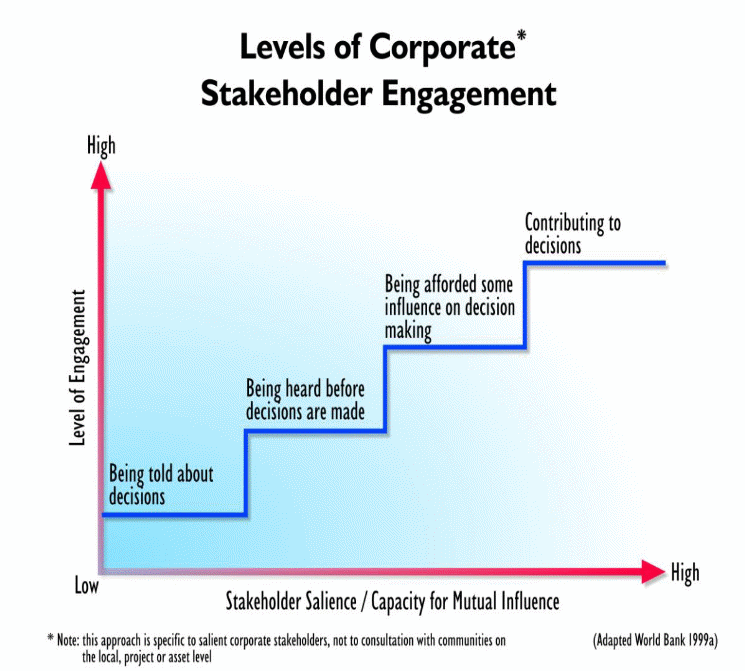
The stakeholder theory emphasises the significance of inclusiveness in organisations’ operations. Sternberg (2001, p.15) asserts that the ‘extreme form of the stakeholder theory is now widely promoted by groups claiming to represent businesses and organisations that influence public policy formation’. For example, in the United States, stakeholder theory has been adopted amongst prominent management groups, for example the Business Roundtable. Additionally, over 38 states in the US have recognised the significance of taking into account the interests of diverse stakeholders. Similarly, the UK adopted the concept of the stakeholder theory in its 1973 Watkinson Report, which highlighted the responsibilities of public companies established in the UK. The theory has since been adopted in the Confederation of British Industry and the Trade Union’s Congress (Sternberg 2001).
Sinclair (2010) argues that the various organisational stakeholders should be engaged in the organisations’ operations in order to achieve sustainable business benefits. The figure below illustrates the relationship between stakeholder engagement and an organisation’s operational efficiency
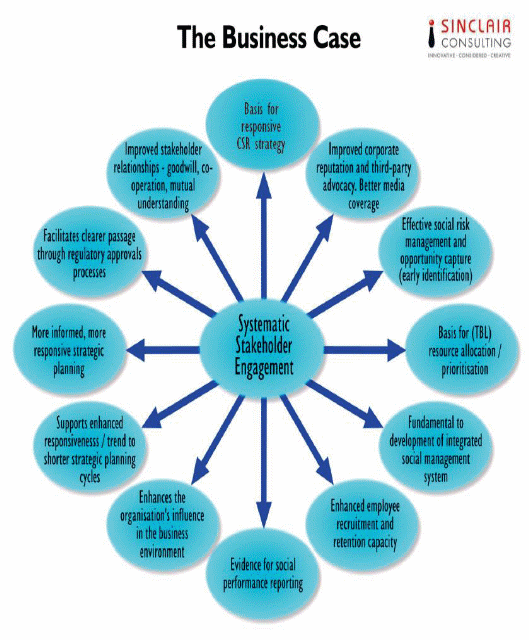
Previous studies have established a strong positive correlation between the quality of stakeholder relationship and the organisations’ financial performance (Brammer & Millington 2005). Additionally, nurturing stakeholder relationships contributes to the improvement in corporate reputation (Sinclair 2010).
Sustainability theory
The 21st century has undergone unprecedented change with regard to corporate strategy. Organisations are increasingly shifting towards sustainable thinking. Therefore, sustainability has become a fundamental aspect in businesses’ efforts to achieve bottom-line benefits. However, achieving sustainability requires organisations to focus on social, environmental, and economic concepts. Consequently, organisational managers are required to be highly concerned with their businesses’ responsibility and values.
Sebhatu (2008, p.1) argues that managing ‘sustainability holistically is challenging and it requires a sound management framework that integrates environmental and social performance into economic business performance’. Measuring the level of sustainability is also challenging as it entails assessing all the organisational dimensions that contribute to corporate sustainability. Available literature shows that CSR supports an organisation’s effort to achieve the desired level of sustainability through the economic, environmental, and social concepts (Melo 2009).
Despite the significance of CSR in achieving organisational sustainability, a number of critics argue that businesses are established with a profit-oriented motive. Consequently, they should not engage in CSR. On the other hand, other studies argue that CSR can be remarkably beneficial to organisations’ operations. Melo (2009, p.8) asserts that CSR ‘is focused on the quest for correlations between corporate financial performance and CSR’. However, this relationship is mainly associated with the image status and reputation that an organisation gains from engaging in CSR. Melo (2009, p.8) is of the opinion that support ‘for CSR creates a reputation [brand value ] that a firm is reliable and honest and that consumers will tend to assume that products from such companies will be of higher quality as compared to their competitors’. Such perception increases the likelihood of corporate social responsible organisations sustaining superior profit margins in the long term.
Industry analysis
The oil and gas industry is considered as a primary industry for its success is largely dependent on natural resources. The high rate of global warming, which is leading to climate change, has increased the call for organisations to operate in an environmental sustainable way. Firms in some economic sectors are culpable for the high rate of global warming. For example, firms in the energy sector such as petroleum, oil, and gas producing companies are increasingly being blamed for the high rate of environmental degradation. Spence (2011, p.28) asserts that the ‘deepwater horizon oil spill in the Gulf of Mexico underscores the magnitude of environmental degradation that is associated with oil and gas development’. Therefore, oil and gas producing companies face enormous reputational risk, which is fundamental in organisations’ long-term success.
Despite the risk involved, oil and gas exploration and extraction is a lucrative business. Petroleum extraction and production is a major source of economic growth for most countries especially the Gulf countries. Oil producing companies are increasingly being criticised by environmental activists and various non-governmental organisations for their lack of commitment in mitigating climate change despite their contribution to environmental degradation. Therefore, it is imperative for these companies to evaluate their current CSR strategies in order to identify possible gaps.
ENOC Company
Emirates National Oil Company [ENOC] was established in 1993 in the United Arabs Emirates [UAE]. The firm is entirely owned by the Dubai government through the Investment Corporation of Dubai. Its headquarters are situated at Dubai. ENOC has achieved substantial growth over the years, which has led to a remarkable development and long-term value. Its success has arisen from the integration of a comprehensive product portfolio, which entails oil trade, oil refining, and bunkering coupled with the production of liquefied petroleum gas, lubricants blending, aviation fuel marketing, and storage.
The firm has amassed a number of international awards for its commitment in adhering to service standards, quality products, and environmental sustainability. Furthermore, ENOC has adopted the concept of corporate social responsibility as one of its organisational purposes and values. Examples of its corporate social responsibility include the Human Fuel Program, which is aimed at supporting the United Nations World Food Programme (UNEP). The ENOC’s CSR strategies as illustrated above can be placed into the above three categories. For example, the firm’s public health activities align with the concept of sustainability. In the course of this case study, ENOC’s existing CSR activities will be categorised using the above theories. Any weaknesses in one category or another will be used to make recommendations for the ENOC’s future CSR strategy based on the American and European best practices.
Methodology
Research design
The objective of this study is to assess how ENOC can improve its corporate social responsibility in order to improve its corporate image. Subsequently, the researcher will adopted deductive approach in order to understand the extent to which ENOC has incorporated stakeholder and sustainability theories in its CSR strategies. Additionally, a positivist approach will be adopted as the research philosophy by verifying the contribution of CSR strategy to the ENOC’s reputation. Subsequently, the researcher will seek the opinion of the firm’s employees.
The researcher will ensure a high degree of validity and reliability of the information gathered. Validity and reliability are greatly influenced by the adopted research design (Krishnaswami & Satyaprasad 2010). The researcher will also adopt case study as the core research strategy by conducting a survey on the ENOC’s CSR. The research onion below illustrates the various research methodologies that will be integrated.
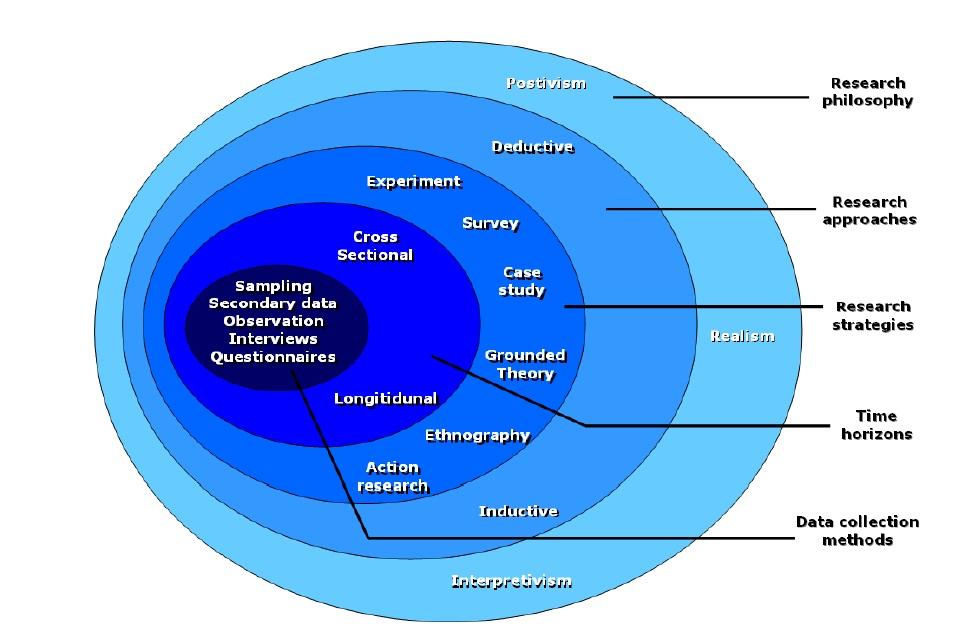
In the process of conducting this study, the researcher will adopt a mixed approach by incorporating both qualitative and quantitative research designs. Using qualitative research design will enable the researcher to gather voluminous qualitative data that will support the effectiveness and efficiency with which data is collected. Jha (2008, p.45) assert that qualitative ‘data entails detailed description of situations, events, observed behaviours, attitudes, beliefs, and thoughts from different sources such as correspondence and case studies’. Moreover, qualitative research design will aid in gathering substantial data, hence improving the effectiveness of developing a comprehensive understanding on the contribution of corporate social responsibility to ENOC’s operation.
Easterby-Smith, Thorpe and Jackson (2008) are of the opinion that qualitative research design has no definite procedure, which makes it a multi-method of research. Subsequently, qualitative research is interpretive in nature. Furthermore, the decision to adopt qualitative research design arises from the view that the researcher gathers data from the natural setting. The voluminous data collected through qualitative research cannot be of great value to the target stakeholders if the researcher does not condense it. Brooks (2006) asserts that quantitative research design entails explaining a particular phenomenon using numerical data and analysing the data statistically. Sachdeva (2009, p.182) asserts that quantitative ‘research design can give a clear picture about what is going on in the particular field of research’.
Population and sampling
In order to gather sufficient data on ENOC’s corporate social responsibility, the researcher will be required to collect data from respondents who are conversant with the firm’s corporate social responsibility aspects. Subsequently, the study’s target population will be comprised of diverse stakeholders such as customers, suppliers, and employees. However, it is difficult to conduct a study on all the stakeholders due to the high resource involved.
Subsequently, simple random sampling technique will be used. According to Demming (2002), simple random sampling makes a particular research study manageable, hence improving the effectiveness with which the research conducts a thorough study. Easterby-Smith, Thorpe and Jackson (2008, p. 213) are of the opinion that simple random sampling technique is used to make a confident statement, having involved different categories of employees’. A sample of 100 respondents will be selected from the field. The study assumes that the responses obtained from the selected sample are representative of the prevailing situation with regard to ENOC’s CSR.
Data analysis and instrumentation
The quality of research data collected has a remarkable influence on the validity and relevance of a study to the intended stakeholders (Laurel 2003). In a bid to improve the validity of the research findings, this study will adopt both primary and secondary sources of data. The primary sources to be used include the selected respondents. On the other hand, secondary data will be obtained from published reports on ENOC’s corporate social responsibility. On the other hand, the researcher will utilise interviews and questionnaires are the core-data collection instruments.
A comprehensive set of semi-structured questionnaires will be formulated and sent to the respondents through emails. The semi-structured questionnaires will include both open-ended and close-ended in nature. The open-ended questionnaire will provide the target respondents with discretion in responding to the questions asked. On the other hand, the close-ended questions will aid in collecting definite answers on some of the issues (Demming 2002). In order to improve the rate of response, the researcher will eliminate any ambiguity by reviewing the questionnaires before distributing them to the selected respondents. Interviews will be conducted through telephone in order to minimise the cost of conducting the study.
The study will adopt Microsoft Excel software in analysing the data collected. The responses obtained from the field will be analysed individually in order to improve the research findings. Microsoft Excel will aid in condensing the data obtained from the field. The software will aid in the representation of data using frequencies. Subsequently, it will be possible for the researcher to understand the correlation between various variables and identify the relationship between different corporate social responsibility aspects (Demming 2002).
Procedures; ethical considerations
The researcher will be committed to sustaining the level of participation amongst the selected respondents to the study. In a bid to achieve this goal, the researcher will observe a number of ethical considerations. First, the researcher will ensure that the respondents’ identity is maintained by keeping confidentiality and anonymity of the respondents’ personal information. Additionally, the researcher will obtain informed consent prior to conducting the study by ensuring that the respondents and the relevant authorities understand that the study is intended for academic purpose and it is not business oriented. This aspect will aid in eliminating any form of suspicion from the respondents and the public. Subsequently, they will be granted the freedom to withdraw from the study if they wish to without any consequences.
Budget
Substantial amount of resources will be consumed in conducting the study. In a bid to ensure that the study does not fail due to lack of resources, the researcher will allocate a substantial amount of money in the research budget as illustrated by the chart below.
In order to eliminate the risk of budget constraint, the researcher will establish an additional $ 500 as contingency fund. Subsequently, any deviation from the set budget will be dealt with successfully.
Time scale
A number of activities are expected to be undertaken in the process of conducting this study. Subsequently, a substantial amount of time will be taken. The researcher expects the study to be completed within 13 weeks. The Gantt chart below illustrates how the various research activities will be distributed.
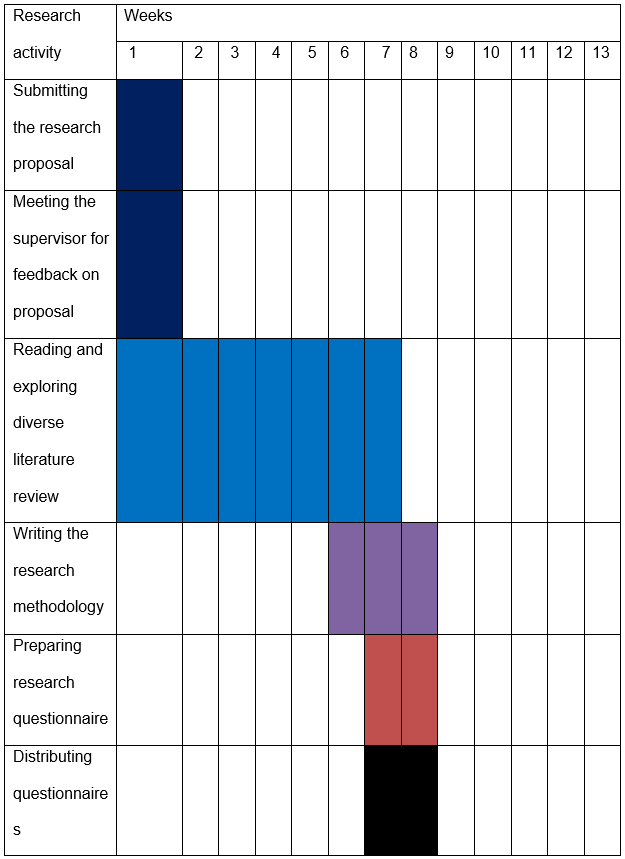
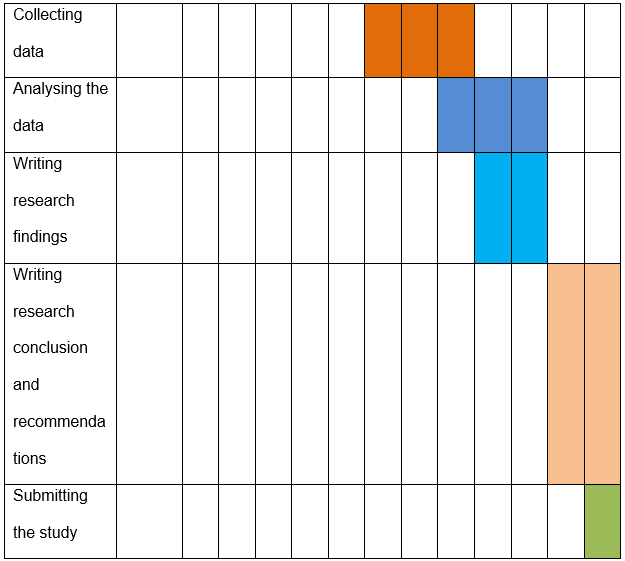
Reference List
Brammer, S & Millington, A 2005, The contribution of corporate social responsibility to organisational commitment, University of Bath, Bath. Web.
Brooks, I 2006, Organisational behaviour: Individuals, Groups and Organisation, Pearson Education Limited, Essex. Web.
Ebner, D 2006, The relationship between sustainable development and corporate social responsibility, University of Leoben, Dublin. Web.
Demming, W 2002, Sample design in business research, Wiley, New York. Easterby-Smith, M, Thorpe, R & Jackson, P 2008, Management research, Sage, London. Web.
Gond, J, Igalens, A & Swaen, V 2010, Corporate social responsibility influence on employees, Nottingham University, Nottingham. Web.
Jha, N 2008, Research Methodology, Global Media, Chandigarh. Web.
Krishnaswami, O & Satyaprasad, B 2010, Business research methods, Global Media, Mumbai. Web.
Laurel, B 2003, Design research; methods and perspectives, MIT Press, London. Melo, T 2009, Effects of corporate social responsibility on brand value, Cengage, London. Web.
Oriesek, D 2004, Maximising corporate reputation through effective governance; a study of structures and behaviours, Universal Publishers, Boca Raton. Web.
Patil, Y 2014, Corporate social responsibility towards environmental management, Symbiosis Law School, Pune. Web.
Rosman, H, Saihani, S & Yusof, N 2013, ‘Attitudes towards corporate social responsibility among budding business leaders’, Social and Behavioural Sciences, vol. 107 no. 11, pp. 52-58. Web.
Sachdeva, J 2009, Business Research Methodology, Global Media, Mumbai. Web.
Sebhatu, S 2008, Sustainability performance measurement for sustainable organisations; beyond compliance and reporting, Karlstad University, Karlstad. Web.
Sinclair, M 2010, Developing a model of effective stakeholder engagement management, Curtin University of Technology, London. Web.
Spence, D 2011, ‘Corporate social responsibility of oil and gas industry; the importance of reputational risk’, Chicago-Kent Law Review, vol. 86 no. 1, pp. 1-29. Web.
Sternberg, E 2001, ‘Stakeholder concept; a mistaken doctrine’, Foundation of Business Responsibilities, vol. 4 no. 4, pp. 1-52. Web.
Wicks, A & Harrison, J 2012, Stakeholder theory, value and firm performance, University of Virginia, Virginia. Web.
